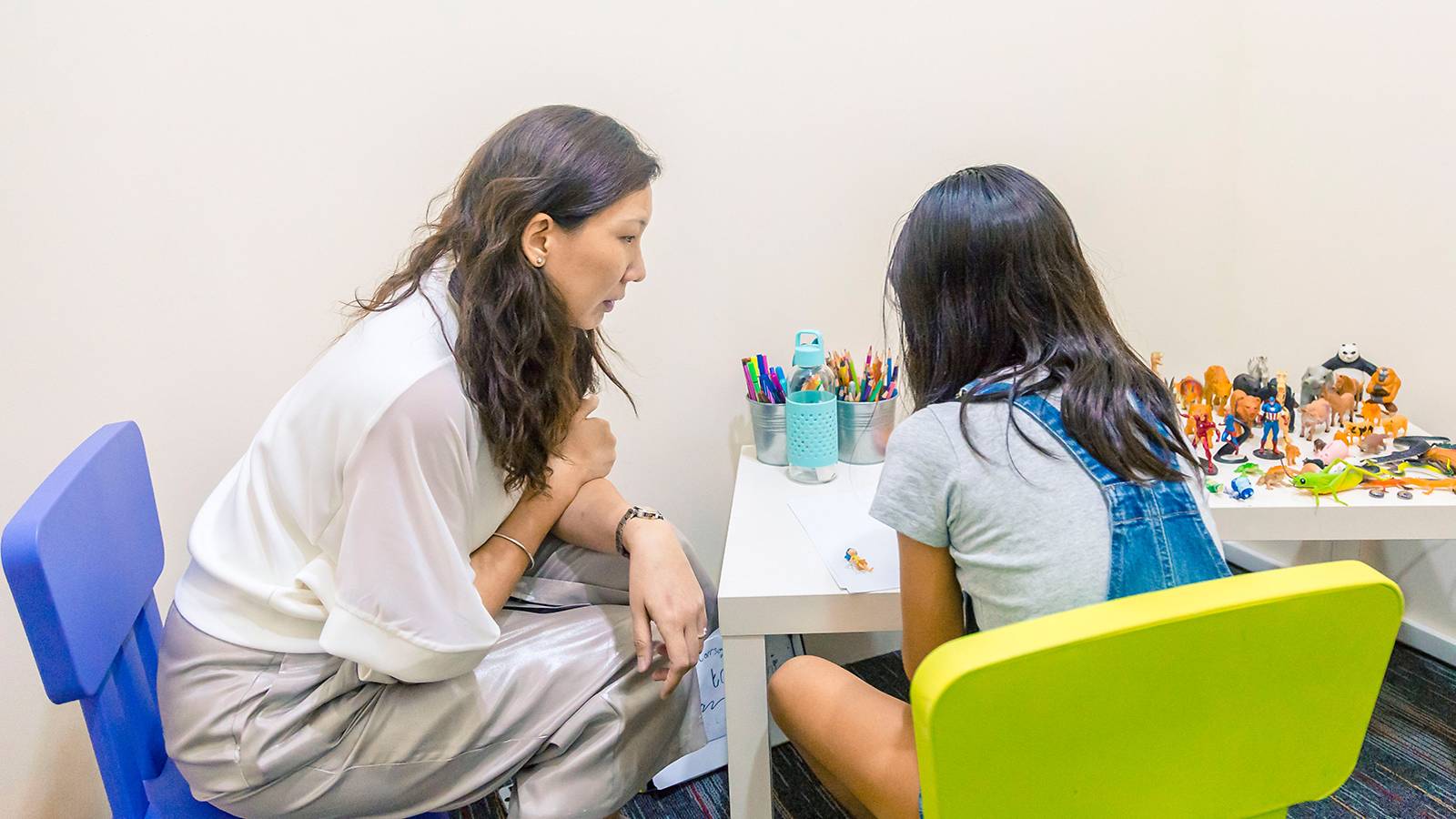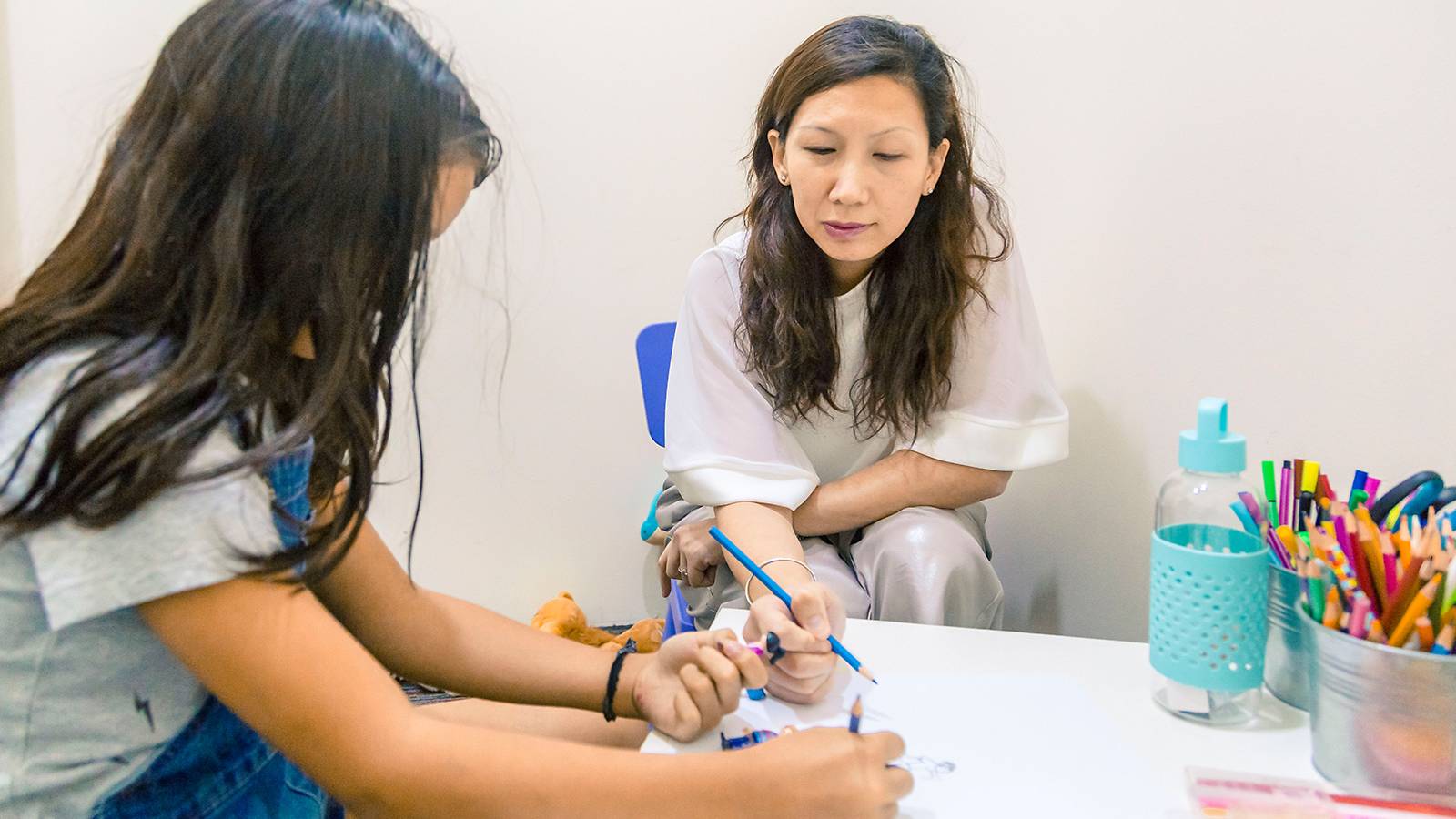Family therapist Swanie Khoo loves to help kids make sense of challenges and teach them how to overcome adversity.

Junior is bound to encounter traumatic events you may not be able to shield him from. The emotional turmoil left on a child who has to deal with sexual, verbal or physical abuse and even the death of loved ones may leave an indelible mark on your child.
In fact, traumatic experiences on kids as young as ages 2 to 4 can change them, even though their brains aren’t fully developed yet. Focus on the Family’s marriage and family counsellor, Swanie Khoo, notes that trauma symptoms will show up in your child’s behaviour years later.
If you think that your child will forget something that happened early on in their lives, think again. Khoo notes, “[These experiences can] shape how they’re coping with life challenges, relationships and the sense of who they are [as a person].”
So, she helps her adult clients work through how their early childhood experiences have shaped them today, “Usually, when [the experience] troubles an individual significantly, they can recall and work through these memories.”
“Children experience traumatic stress when they’re exposed to events or situations that overwhelm their ability to cope.”
SmartParents sits down with Khoo to learn more about the devastating effects of severe stress on children…
What does the term trauma actually mean?
Children experience traumatic stress when they’re exposed to events or situations that overwhelm their ability to cope. How the child experiences traumatic events and how they express their distress depends largely on the child’s age and development.
What are some common causes of childhood trauma?
There are many different causes of trauma. These can range from sexual abuse or rape, physical, verbal or emotional abuse, to natural disasters like floods and earthquakes and serious accidents. They can also suffer a traumatic loss like a sudden or violent death of a loved one or have parents with a mental illness, abuse substances or are incarcerated.
A kid may be facing different types of trauma such as:
* Acute trauma A single event that lasts for a short time including being in a bad accident.
* Chronic trauma Experiencing multiple traumatic events over a long period of time, which causes its effects to build over time. This includes recurrent sexual abuse or domestic violence in the home.
* Complex trauma Refers to some kind of chronic trauma caused by the child’s caregivers. Examples include sexual abuse by the father or severe neglect by locking a child in a closet.

We often hear the term Post-Traumatic Stress Disorder (PTSD), what does it mean?
Post-traumatic stress is the psychological reaction to a severely stressful and physically threatening event that results in extended periods of anxiety, flashbacks, hypervigilance, suicidal tendencies, and other mental health concerns. It also may affect their day-to-day lives. People who experience PTSD may continue to feel afraid or anxious even when no danger is present.
Isn’t PTSD usually associated with military people?
After experiencing a traumatic event, all of us will display post-traumatic symptoms for a period of time. However, when individuals are unable to overcome the stress and display certain symptoms, then they need to seek help. Sometimes, it can also affect one’s normal functioning. Under such circumstances, through proper clinical assessment they may be diagnosed as having PTSD.
What symptoms of PTSD should parents look out for?
There are five broad symptoms:
* Re-experiencing The person feels that she is actually going through the traumatic event all over again. For example, a girl has frequent nightmares about being abused and she wakes up crying out and takes 20 minutes to settle down every time this happens.
* Avoidance Purposefully avoiding situations that trigger memories of the traumatic event to prevent another bad thing from happening. Say, a child who is bullied in school and cannot avoid such situations may turn to other means to forget or block the event, by becoming thrill seekers or troublemakers or engaging in extreme behaviour.
* Hyper-vigilance Always on the look-out for danger. Many times, even normal events can be interpreted as threatening because the person is overly sensitive to danger when in this state. A child who has experienced a car accident might react anxiously when a teacher gets them to read or compose an essay about an accident.
* Emotional numbness An inability to feel certain emotions. An adolescent girl who saw her father beating her mother might say that she doesn’t feel anything when asked how she felt about witnessing it.
* Affect dysregulation When individuals over-react strongly to small things because they feel sensitive and are on edge because of past experiences. This sensitivity can make them impulsive when they react as they have difficulty managing their emotional responses. A child who gets beaten at home gets bumped into along the hallway at school, may react by hitting the person. He has lost his ability to control his emotions and lashes out inappropriately response.
“The willingness to seek professional help is part of self-care — in so many ways, that is strength, not weakness.”
How do you decide if medication or therapy is the right approach to helping your PTSD client?
When the condition is severe and assessed to be a PTSD, I may refer clients to a psychiatrist for medication to help with their symptoms. At the same time, I’ll continue to work with the clients through counselling. In some cases, psychiatrists give medication such as anti-depressants, anti-anxiety medications, and mood stabilisers to manage more challenging symptoms of post-traumatic stress.
Have you seen an increase in the number of children who need trauma counselling?
I wouldn’t say that there has been an increase in trauma counselling cases. I believe, the incidences of trauma have been underestimated due to under-reporting, and over the years, we’ve become more informed and educated about trauma and its link to mental health. As a result, we have a better understanding of children and their behaviours.
How did you get started as a trauma counsellor?
My strong interest in trauma work led me to start counselling adolescents at various girls’ homes in Singapore. Over the years, I have had experience working with individuals and children who had been victims of abuse, neglect, abandonment and rape. Today, I am a trained Trauma Therapist under Temasek Cares Trauma Network for Children. The focus of my work is not only trauma. I do see a wide range of clients from children and their parents, couples to individuals coping with a wide range of mental health, interpersonal and behavioural issues.
What do you find most rewarding about your job?
Working with children and adolescents has been the most rewarding through all my years in counselling. When these children open up their life to me, it’s an opportunity and privilege to enter their little world, and allows me to ease them through this difficult phase in their lives. Entering a child’s world is like a joining them on a journey of making new meaning from their life experiences. The children may not know it, but they have taught me much about myself and how to do better work as a counsellor. The greatest joy is seeing them grow resilient and have greater confidence in themselves.
What are some common misconceptions people have about your job?
Even as our society has become more open to the idea of seeking counselling, there are still some misconceptions that may discourage people from seeking help. One of it is the misconception among school-going kids about undergoing counselling means dealing with disciplinary — as a result of misbehaving — and serious mental health issues. To them, going to the counsellor means ‘I have done something bad’ or ‘I am bad’. Therefore, they feel it’s shameful to be sent to the counsellor, and are often times fearful of what their peers would think of them.
Another age-old misconception is that people who seek therapy are ‘weak’ or ‘crazy’ or flawed in some way. This is mainly due to the belief that we should be able to solve all our problems on our own and asking for help, especially from a professional, would mean that one is ‘weak’ or ‘crazy’. There will always be people who are able to cope, adapt and overcome these challenges, but this does not mean that one ‘should’ be able to figure everything out on your own. The willingness to seek professional help is part of self-care — in so many ways, that is strength, not weakness. It is actually saying to ourselves, “I want to work on this matter, I want to take responsibility for this, and I want to learn to do better”.
Seeking help from a counsellor helps individuals work through these issues more effectively. We help you build your sense of self-worth and confidence, help you gain a new perspective on your life, and consequently, help you better manage and overcome your daily life challenges.
This interview has been edited for clarity.
Photos: Focus on the Family
Like us on Facebook and check SmartParents regularly for the latest reads!
Check out these stories, too…
CONVERSATIONS WITH… A Marriage Counsellor

